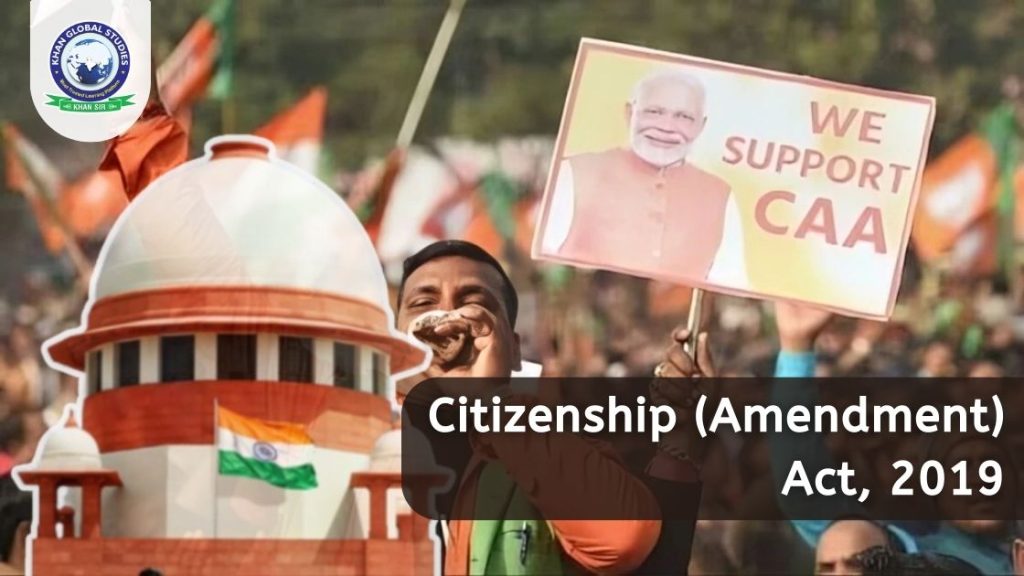There is an uproar across the country over CAA (Citizenship Amendment Act, 2019). The discussion regarding CAA has once again intensified across the country. Even before this, controversies have often been seen regarding the Citizenship Amendment Act. At the same time, some time ago Union Minister Amit Shah had said that CAA is the law of the country and it will be implemented under all circumstances.
Uttarakhand Chief Minister Pushkar Singh Dhami had also made it clear some time ago that UCC will soon be implemented in the state. Its draft has been prepared and it has also been presented on 2 February.
At the same time, on January 29, 2024, Union Minister Shantanu Thakur also claimed in West Bengal that the CAA would be implemented within a week. During this, he also said that it will be implemented not only in West Bengal but in the entire country.
What is the Citizenship Amendment Act?
The CAA (Citizenship Amendment Act), 2019 opens the way for granting Indian citizenship to minorities from three neighbouring countries (Pakistan, Afghanistan and Bangladesh) who have taken refuge in India for a long time. There is no provision in this law to take away the citizenship of any Indian, irrespective of his religion. There is no threat to the citizenship of Muslims of India or people of any religion or community from this law.
When was CAA passed?
The CAA was passed in the Indian Parliament on December 11, 2019, with 125 votes in favour and 105 against. This bill was also approved by the President on 12 December. While the Modi government and its supporters are calling it a historic step, it is being strongly opposed by the opposition and Muslim organizations.
The full name of the Citizenship Amendment Act i.e. CAA is the Citizenship Amendment Act. This was CAB (Citizenship Amendment Bill) before it was passed in Parliament. After getting the approval of the President, this bill has become the Citizenship Amendment Act (CAA).
Why is there controversy regarding CAA?
The Citizenship (Amendment) Act provides for granting Indian citizenship to illegal immigrants belonging to specific religious communities (Hindus, Sikhs, Jains, Christians, Buddhists and Parsis) from Afghanistan, Bangladesh and Pakistan. On this, some critics say that this provision is discriminatory because Muslims are not included in it. Due to this, it is surrounded by controversies.
Why have Muslims not been included in CAA yet?
Regarding the Citizenship Amendment Act, Home Minister Amit Shah had said in Parliament that Afghanistan, Pakistan and Bangladesh are Muslim countries. The majority of Muslims there are not tortured in the name of religion, whereas in these countries, people of other communities including Hindus are tortured based on religion. Therefore, Muslims in these countries have not been included in the citizenship law. However, even after this, he can apply for citizenship, which the government will consider and make a decision.
Who will get citizenship?
After the implementation of CAA, the right to grant citizenship will be completed by the Central Government. Refugees of Hindu, Sikh, Buddhist, Jain, Christian and Parsi religions from Pakistan, Bangladesh and Afghanistan will be given Indian citizenship. Let us tell you that only those who came and settled in India before 31 December 2014 will get citizenship. Under this law, those people have been considered illegal immigrants, who have entered India without valid travel documents (passport and visa) or come to India with valid documents but have stayed here for more than the prescribed period. Have gone.
How to apply for citizenship?
The entire process of obtaining citizenship has been kept online. An online portal has also been prepared in this regard. To get citizenship, applicants will have to state the year in which they entered India without any documents. No document of any kind will be asked from the applicant. All pending cases related to citizenship will be transferred online. Eligible displaced persons will have to apply only by visiting the online portal. After which the Home Ministry will examine the application and citizenship will be issued to the applicant.
Why are CAA and UCC not implemented yet?
There is an uproar in many states of the country regarding the implementation of CAA and UCC. Protests were seen in many states against CAA and UCC, due to which these laws could not be implemented. Because of the continuous protests in many states, the Central Government also presented its arguments. The Central Government had said that gender equality cannot be implemented until the Uniform Civil Code is implemented in the country.
What is the Uniform Civil Code?
Discussions regarding the Uniform Civil Code have once again intensified. The government has indicated to implement it, after which there is discussion among the people about UCC.
Let us tell you that it is said in UCC that a uniform law should be made for all religions and communities of the country. If understood in simple language, this law means that the law will be the same for all religions and communities in the country. Various existing laws based on religion and religion will become ineffective. Let us tell you that many changes will come after the implementation of UCC.
For example, there will be one rule for everyone in marriage, divorce, adoption and property. There will be equality in mutual relations and the rights of family members. No relaxation will be given in the rules based on caste, religion or tradition. There will be no separate rules for any particular religion.
What is the constitutional validity of UCC?
The Uniform Civil Code comes under Article 44 of the Constitution. Which states that the states will try to ensure a uniform civil code for citizens throughout India. According to this article, there is a demand to implement a Uniform Civil Code in the country.
What will be the changes when UCC is implemented?
Let us tell you that after the implementation of UCC, issues like marriage, divorce, property, adoption etc. will come to the fore. Also, there will be only one law for marriage and divorce in every religion. The law which will be for Hindus will be for others also. Without divorce, you will not be able to do more than one marriage. The property will not be divided as per Shariat.
What will not change due to the implementation of UCC?
Many types of stories keep running in the minds of people regarding UCC. Due to which many people are seen opposing it because, in reality, they have various misconceptions about it. Know what will not change with the implementation of UCC-
There will be no difference in the religious beliefs of people after the implementation of UCC. At the same time, after the implementation of UCC, there will be no impact on religious customs. It is not that Pandits or Maulvis will not be able to conduct marriages of people (there will be no change in this).
Citizenship (Amendment) Bill, 2016 (passed by Lok Sabha)
Eligibility for citizenship for certain illegal immigrants: The Act prevents illegal immigrants from acquiring Indian citizenship. Illegal migrants are foreigners who enter India without a valid passport or travel document or overstay beyond the permitted time.
The Bill amended the Act to provide that Hindus, Sikhs, Buddhists, Jains, Parsis and Christians from Afghanistan, Bangladesh and Pakistan would not be considered illegal immigrants. To avail of this benefit, they must also have been exempted by the Central Government from the Foreigners Act, of 1946 and the Passport (Entry into India) Act, of 1920. The 1920 Act mandates foreigners to carry passports, while the 1946 Act regulates the entry and exit of foreigners into India.
The Bill further states that from the date of its coming into force, all legal proceedings pending against such illegal migrants will be closed.
Citizenship by Naturalization: The Act allows a person to apply for citizenship by naturalization if that person meets certain qualifications. One of the qualifications is that the person must have resided in India for at least 11 of the last 12 months and must have been in the service of the Central Government for the last 14 years.
The Bill made an exception for Hindus, Sikhs, Buddhists, Jains, Parsis and Christians from Afghanistan, Bangladesh and Pakistan to this qualification. For these groups of individuals, the 11-year requirement will be reduced to six years.
Grounds for cancellation of OCI Registration: The Act provides that the Central Government can cancel the registration of OCI on five grounds, including registration through fraud, not showing allegiance to the Constitution, engaging with the enemy during war, and interference with the sovereignty of India. Intervention is involved. Intervention is involved. Intervention is involved. Intervention is involved. Intervention is involved. Intervention is involved. , interests are involved. Necessity, and safety involved. State or public interest, or if the OCI has been sentenced to imprisonment for two years or more within five years of registration.
The Bill adds one more ground for cancellation of registration, that is if the OCI has violated any law in force in the country.
When the bill was passed in the Lok Sabha, it was amended to limit the disqualification to violation of the Citizenship Act or any other law notified by the Central Government. Besides, the cardholder will also have to be allowed to be heard.
Citizenship (Amendment) Bill 2019
The bill adds two additional provisions on citizenship for illegal immigrants belonging to these religions from the three countries.
Consequences of acquiring citizenship: The Bill states that upon acquiring citizenship:
- such persons shall be deemed citizens of India from the date of their entry into India
- All legal proceedings will be taken against them in connection with their illegal migration. Or citizenship will be stopped.
- Exception: Additionally, the Bill states that the provisions of citizenship for illegal immigrants will not apply to the tribal areas of Assam, Meghalaya, Mizoram or Tripura, as contained in the Sixth Schedule of the Constitution. These tribal regions include Karbi Anglong (in Assam), Garo Hills (in Meghalaya), Chakma district (in Mizoram), and Tripura Tribal Areas. It will also not apply to areas falling under the Inner Line under the Bengal Eastern Frontier Regulation, 1873. Inner Line Permit regulates travel of Indians to Arunachal Pradesh, Mizoram and Nagaland.
- The Bill reduces the period of naturalization from six years to five years for such a group of persons.
- Similar to the 2016 bill passed by the Lok Sabha.
FAQ
Question: Why are CAA and UCC not implemented yet?
Answer: There is an uproar in many states of the country regarding the implementation of CAA and UCC. Protests were seen in many states against CAA and UCC, due to which these laws could not be implemented. Given the continuous protests in many states, the Central Government also presented its arguments. The Central Government had said that gender equality cannot be implemented until the Uniform Civil Code is implemented in the country.
Question: What is the constitutional validity of UCC?
Answer: Uniform Civil Code comes under Article 44 of the Constitution. Which states that the states will try to ensure a uniform civil code for citizens throughout India. Under this article, there is a demand to implement a Uniform Civil Code in the country.
Question: What will be the changes when UCC is implemented?
Answer: After the implementation of UCC, matters like marriage, divorce, property, adoption etc. will end. Also, there will be only one law for marriage and divorce in every religion. The law which will be for Hindus will be for others also. Without divorce, you will not be able to marry more than once. The property will not be divided according to Shariat.
Question: What will not change with the implementation of UCC?
Answer: There will be no difference in the religious beliefs of people after the implementation of UCC. At the same time, after the implementation of UCC, there will be no impact on religious customs. It is not that Pandits or Maulvis will not be able to conduct marriages of people (there will be no change in this).




